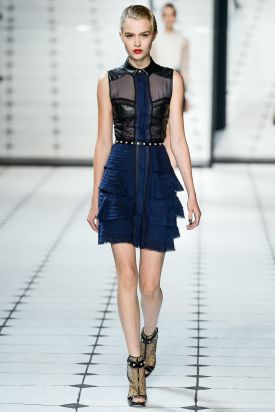Well, I guess fashionistas had it coming. My key takeaway after reading Lourd De Veyra’s tirade against the fashion-conscious, Sermon sa Mga Fashyown is the notion of fashion as a form of self-expression to which The Lourd argues using the question: So you mean your self-expression changes with the comings and goings of fads?
Well, ummm, yes and no.

Beauty: It’s nothing personal.
| SUPPORT INDEPENDENT SOCIAL COMMENTARY! Subscribe to our Substack community GRP Insider to receive by email our in-depth free weekly newsletter. Opt into a paid subscription and you'll get premium insider briefs and insights from us. Subscribe to our Substack newsletter, GRP Insider! Learn more |
This is probably why it is the young that tends to be fashion- and brand-conscious — because that is what young people do: experiment. Being young, the youth have yet to acquire life’s bigger contexts and longer perspectives. They have none of the stable cognitive bedrocks that older people have. But, see, that experimentation and trial-and-error phase is precisely what builds those bedrocks of our psyches. You can tell a toddler not to carelessly run around the house ’til the cows come home. But it is only when he finally hits his head against the corner of your dining table that he will appreciate what you had been trying to warn him about.
I did say earlier that fashionistas had it coming, didn’t I? That’s because, on the other hand, there are some people who don’t seem to get fashion. And, in all ironies, these are the ones that, to the untrained eye, do come across as the “fashionistas” that The Lourd may have been referring to. They are fashionistas because their fashion sense is like a sail — it gets blown by to wherever there is a sale. There is a more precise term for these sorts that has been been around a lot longer — fashion victims. There are the trend-setters — people who drive fashion — and then there are their victims — people who are driven by fashion. I don’t presume to read de Veyra’s mind but I hazard a guess that it is the latter he is referring to.
Whether we like it or not, the human mind applies pretty clear notions of what is physically beautiful, often subconsciously. So though beauty may be in the eye of the beholder (as many poets insist), in the bigger scheme of things, standards of beauty tend to be pretty consistent across time and cultures. There is a reason for this. Much of what we regard as beautiful are fitness indicators we are neurologically programmed to respond to. Full lips, lateral anatomical symmetry, thick smooth hair, toned muscles, and eyes that are large in proportion to the face indicate youth. And where there is youth, there is fertility. So beauty is a strong concept in all of our psyches because it plays an important part in the survival of our species. With our limited resources, we have been programmed by evolution to seek the most viable vessels — and deepest resources — through which we could propagate our respective DNA patterns.
So we should give ourselves — and The Lourd — a bit of credit and admit to the reality that there really is something to our aversion to the ugly and attraction to the beautiful. That’s our brain stems at work. It is all in our nature. Our minds and the civilisations we built around us just got better over the last 2,000 years at politically-correcting our primal motivations beyond recognition.
But 2,000 years is but a blink of an eye when one regards the hundreds of thousands of years of evolution that programmed — no, burnt-in — the notion of “beauty” into our psyches. In spite of the propaganda of marketers, the catch phrases of motivational speakers, the 7-step processes in feel-good books, and the legislated civility that governs societies today, we are all, at heart, seekers of young and healthy mates. For the boys that means doe-eyed chicks that look good in bikinis and for the girls that means guys with a full head of hair dressed in black shiny slim-fitting suits driving a red Ferrari. It’s nothing personal. Guys look for the viable vessel, girls look for the sutainable resources. It’s just business — the business of propagating one’s genes into the next generation.
Fashion trends, in a sense, are the apps running on top of the operating system that is our evolutionarily-programmed sense of beauty. Getting a mate is, after all, the monumental — often violent — one upmanship against the other that nature intended it to be to ensure that subsequent generations were better than the ones preceding them. We are all products of generations of “winners” — ancestors who, for millions of years, managed to kill the competition (often literally) to get the girl.
In today’s more civilised and relatively less-violent way of life, fashion trending is the proxy to head-butting, cat fighting, jousting, duelling and backstabbing of antiquity. Se let’s be thankful for all the fashion designers and the products they make available to our generation. They are certainly the more benign tools of one-upmanship for today’s mating games compared to what our ancestors had to work with.
benign0 is the Webmaster of GetRealPhilippines.com.
See “The Naked Ape” (1967) by Desmond Morris. It is a controversial book that advocates the idea that sexuality; rather than morality is what has shaped modern civilization.
I’ve heard of that book. The idea has kind of gone mainstream now and there are a lot of books on the subject of evolutionary psychology that have been published in recent years.
Adapt or Perish…kinda reminds me of Evolution. But those words ring a really loud bell and truth hurts. In my case, honestly if I don’t adapt I will perish and that’s it. It is enlightening to read something like this in which I really need to make some changes to myself and soon.
Thanks!